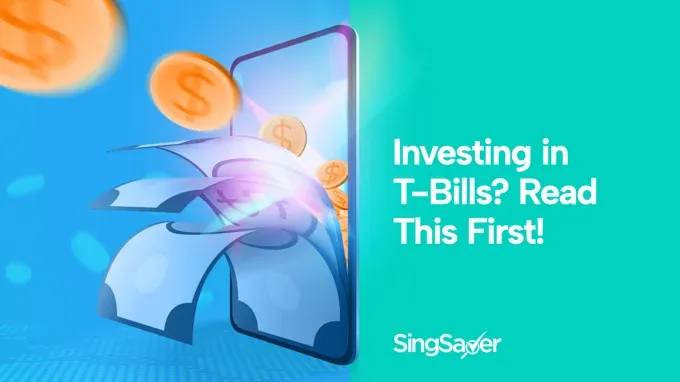T-Bills in Singapore: The Complete Beginner’s Guide (2025)
Updated: 26 Aug 2025
Written bySingSaver Team
Team

The information on this page is for educational and informational purposes only and should not be considered financial or investment advice. While we review and compare financial products to help you find the best options, we do not provide personalised recommendations or investment advisory services. Always do your own research or consult a licensed financial professional before making any financial decisions.
Looking for a safe way to earn more from your savings or put your CPF-OA to better use? You’ve come to the right place.
This guide breaks down everything you need to know about Treasury Bills (T-bills) in Singapore — simplified for first-time investors who want to start smart, stay safe, and grow their money without unnecessary risk. Whether you're holding idle cash, planning for retirement, or exploring CPF investment options, this beginner-friendly guide will show you how T-bills can help.
>> More : How to start investing in Singapore (2025): Beginner-friendly tips
What are T-bills and how do they work?
Imagine lending your money to the Government for a short while — and getting paid back a little extra. That’s essentially what T-bills are.
These are short-term debt securities issued by the Singapore Government as part of the broader Singapore Government Securities (SGS) framework. They’re widely considered one of the safest ways to invest in Singapore.
-
Tenure: Available in 6-month and 1-year durations.
-
How they work: T-bills are sold at a discount and redeemed at face value. For example, you might buy a S$10,000 T-bill for S$9,800 and get back the full S$10,000 upon maturity. That difference is your return — effectively the interest.
Because they’re backed by the Singapore Government, the risk of default is extremely low. This makes T-bills an attractive option for conservative investors and CPF members looking to optimise their CPF-OA funds.
Why new investors should consider T-bills
If you're just dipping your toes into the investment pool, T-bills are a pretty solid starting point for several reasons:
-
Low risk: You won't lose your initial capital if you hold onto them until they mature. It’s like putting your money in a super-safe vault.
-
Short tenure: Not keen on locking up your money for ages? Singapore T-bills are perfect. With 6-month or 1-year options, you'll see your funds back relatively quickly.
-
Higher returns: In many cases, the T-bill interest rate in Singapore has offered better returns than traditional bank savings accounts or even your CPF-OA's default 2.5% p.a. interest.
-
CPF-OA and SRS compatible: You can invest CPF-OA in T-bills or use your Supplementary Retirement Scheme (SRS) funds to buy T-bills in Singapore, making them very popular for boosting those retirement savings.
-
Builds confidence before moving on to more complex instruments.
>> More : Investment fees in Singapore: A guide to understanding what you're paying for
How to buy T-bills in Singapore (2025 guide)
Buying T-bills is surprisingly straightforward. Here’s your step-by-step guide:
Step 1: Know your application options
You can buy Treasury Bills Singapore using:
-
Cash: This is done via your internet banking portal (DBS, UOB, OCBC) or through certain brokerages.
-
CPF-OA or SRS: For these, you must apply through online banking with DBS, UOB, or OCBC. Brokerages don't handle CPF T-bill applications directly.
Step 2: Open the right account
-
For cash purchases: Use either online banking or platforms like FSMOne, moomoo SG, or Tiger Brokers.
-
For CPF or SRS: Internet banking is sufficient.
Step 3: Choose competitive or non-competitive bidding
-
Non-competitive: You accept whatever cut-off yield is decided. Lower risk of rejection.
-
Competitive: You specify the minimum yield you’ll accept. If it’s too high, you may not get any allocation.
>> More : What to do when the stock market crashes
Step 4: Submit your bid
-
Log in to your bank’s internet banking.
-
Navigate to "Investments" > "T-bills" or "SGS".
-
Enter your details and submit before the deadline (usually 1 working day before auction date).
Step 5: Wait for auction results
Once the bidding closes, you'll need to wait for the results. The Monetary Authority of Singapore (MAS) will publish the cut-off T-bill yield, a summary of all the bids, and the allocation outcome on their website (MAS Auction Results). This is where you find the official T-bill interest rate in Singapore.
Step 6: Receive your payout at maturity
Six months or one year down the line (depending on your T-bill's tenure), you'll get your money back! The full face value (usually S$10,000 per unit) is returned to you. If you use your CPF or SRS funds, the money goes straight back into your respective accounts, ready for your next investment or to continue earning its default interest.
Saving vs. investing in Singapore: What's best for you?
Confused about saving vs. investing? Discover when to do each, how they work, and find your ideal path to building wealth in Singapore.
Using CPF-OA to buy T-bills: Worth it?
CPF vs T-bill yield comparison
Your CPF-OA earns 2.5% p.a. by default. But if a T-bill yields 3.9%, you could potentially earn more — even after forfeiting CPF interest.
Example: Investing S$20,000 from CPF-OA into a 6-month T-bill at 3.9% could net you about S$280 more than leaving it idle.
CPF-OA impact on mortgage payments
If you use CPF-OA for housing loans, remember:
-
That money won’t be available while invested in T-bills.
-
You might need to pay your mortgage using cash during the T-bill tenure.
Plan ahead if you're relying on CPF-OA for monthly mortgage deductions.
>> More : CPF Investment Schemes explained
Laddering strategy: How to invest consistently
Rather than putting a lump sum into a single T-bill, you can spread your investments across multiple auctions. This is called laddering.
Benefits:
-
Rolling returns: T-bills mature regularly.
-
Consistent exposure: Always earning current yields.
-
Cash flow visibility: You know when funds return.
-
Rate averaging: Capture both high and low yields over time.
T-bills, SSBs, SGS bonds, or fixed deposits: What’s the difference and which is better?
Singapore offers several low-risk, government-backed or bank-guaranteed options to grow your savings — but each serves a different purpose.
Let’s break down the key differences.
|
Feature |
T-bills |
SSBs |
SGS Bonds |
Fixed Deposits |
|
Purpose |
Short-term cash management |
Flexible long-term savings |
Long-term capital preservation |
Short- to mid-term cash parking |
|
Tenure |
6M or 1Y |
Up to 10Y |
2 to 50Y |
3M to 24M+ |
|
Interest Type |
Discount yield at maturity |
Step-up interest |
Fixed coupon (semi-annual) |
Fixed interest |
|
Liquidity |
Low (no early withdrawal) |
High (monthly redemptions) |
High (traded, but price may fluctuate) |
Low (penalty for early exit) |
|
Min. Investment |
S$1,000 |
S$500 |
S$1,000 (primary), varies secondary |
Varies by bank, usually S$500–S$5,000 |
|
Application Via |
Online banking, brokers |
Online banking |
Online banking (primary), brokers |
Bank branches or online banking |
|
CPF Eligible |
Yes |
No |
Yes (primary only, limited retail access) |
No |
|
SRS Eligible |
Yes |
No |
No |
No |
|
Risk Level |
Very low (government-backed) |
Extremely low (government-backed) |
Low (govt-backed, market risk applies) |
Low (bank-backed, early exit risk) |
|
Estimated Yield (2025) |
~3.7% p.a. |
~3.1% average |
~3.0–3.5% depending on maturity |
~2.9–3.2% p.a. |
|
Early Exit Penalty |
Not allowed |
None |
Market risk if sold before maturity |
Loss of interest |
Bullish vs. bearish market: What investors need to know
Confused by market jargon like "bull" and "bear"? Understand these key investment terms and how they impact your portfolio in Singapore.
When to choose each
T-bills
Ideal for CPF-OA users and cash savers looking for a low-risk, higher-yield option over 6 to 12 months. Great alternative to fixed deposits with better returns.
SSBs
A solid choice for emergency savings or long-term low-risk goals. Perfect if you want flexibility without worrying about timing the market or early withdrawal penalties.
SGS Bonds
Suited for seasoned investors or those seeking fixed income over decades. Suitable for long-term strategies or as part of a diversified portfolio.
Fixed Deposits
Best for short-term certainty or older investors who prefer traditional products. Good when promotional rates are available — especially with short lock-in periods.
Risks and downsides to consider
Even though T-bills are very low risk, they’re not risk-free. Here's what to keep in mind:
-
Illiquidity: You can’t exit early once you’ve bought them.
-
Reinvestment risk: Future yields may drop.
-
CPF opportunity cost: You lose 2.5% p.a. interest from CPF-OA during the T-bill tenure.
-
Mortgage disruption: CPF-OA funds won’t be available for housing payments.
-
Bidding risk: With competitive bids, you might miss out if your desired yield is too high.
>> Discover the best investment strategies for every stage of life
Advanced: Buying T-bills on the secondary market
Retail investors can technically buy T-bills on the secondary market via SGX, but:
-
Access is limited to certain brokerages.
-
Market prices fluctuate, affecting your effective yield.
-
Most investors are better off participating directly in the MAS auctions.
Who should consider T-bills?
T-bills are a great fit for a few specific groups:
Young working adults
-
If you have idle savings sitting in a low-interest bank account before you decide on a long-term investment in Singapore.
-
A safer place to park your bonus or emergency fund where it can earn a decent return without significant risk.
CPF-OA savers approaching age 55
-
Use T-bills to temporarily "shield" CPF-OA funds from being automatically transferred to your CPF Retirement Account (RA) when you turn 55. This gives you more control over your CPF funds.
Risk-averse retirees
-
Preserve capital while earning decent returns, often a good low-risk investment Singapore strategy for retirement.
Need financial advice in Singapore? find a certified financial planner (CFP)
Unlock your financial future! Learn how a Certified Financial Planner (CFP) in Singapore can help you achieve your money goals and make smarter decisions.
Wrapping it up: Your guide to T-Bills in Singapore
T-bills aren’t just safe — they’re smart. Whether you’re optimising CPF, parking emergency savings, or building your first investment ladder, they offer a flexible, low-risk way to grow your money in 2025.
>> More : Wealth planning singapore: 5 proven tips to grow your money smartly
Frequently asked questions about T-Bills in Singapore
-
Use CPF-OA if the T-bill yield is significantly higher than your CPF-OA's default 2.5% p.a. (aim for 3.15% or more to truly beat it). This is key for investing CPF-OA.
-
Use SRS if you have excess retirement funds and want them to grow tax-free (investment returns from SRS are tax-free until withdrawal at retirement age).
-
Use cash if you're holding idle funds in your bank account that you want to earn a better return on, or if you're building an emergency savings fund.
Not if you hold them until maturity. They are Government-backed, making them extremely safe. There are no price fluctuations to worry about once you own them.
The minimum investment for T-bills is S$1,000, and you can invest in multiples of S$1,000 (e.g., S$2,000, S$5,000, S$10,000).
No. T-bill returns are not subject to income tax in Singapore for individuals.
You can easily check the historical T-bill yields by referring to the MAS auction history on the Monetary Authority of Singapore's (MAS) official website (MAS.gov.sg).
Yes, absolutely! T-bill auctions are conducted fortnightly, meaning roughly every two weeks. This allows for consistent investment and strategies like laddering.
This depends on your personal financial goals:
Relevant articles
About the author
SingSaver Team
At SingSaver, we make personal finance accessible with easy to understand personal finance reads, tools and money hacks that simplify all of life’s financial decisions for you.
